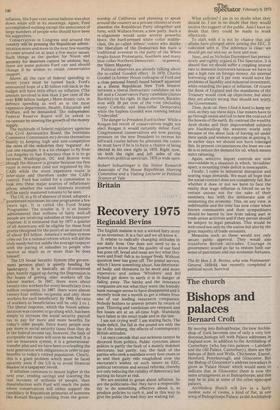Recovery 1975
Reginald Bevins
The English malaise is not a wicked fairy story or an invention. It is a fact and we all know it.
It relates to radically changing attitudes in Our daily lives. One does not need to be a gourmet to know that the quality of our food has gone off, bread and meat are not what they were and fresh fish is no longer fresh. Without question beer has gone off. The postal service, which I know something about, has deteriorated badly and threatens to be more and more expensive; and unless 'Whiskers' and Bill Ryland get down to earth it is in danger of fading away. The banks and the insurance companies are not what they were: the friendly bank manager seems to have disappeared and it recently took me a month to get a rebate from one of our leading insurance companies. Nobody bothers to answer letters by return of post. Thieving and vandalism are rampant and fire losses are at an all-time high. Standards have fallen in the retail trade and in the law.
I am not crying wolf. I am stating facts. The trade deficit, the fall in the pound are only the tip of the iceberg, the effects of contemporary British attitudes.
I at once concede that our sickness cannot be divorced from politics. Public cynicism about politics is partly the fault of a mainly indolent electorate, but partly, too, the fault of the parties who seek a mandate every four years or so and then gaily ride roughshod over the electorate's wishes on such issues as EEC, political terrorism and sexual reforms, thereby not only reducing the validity of democracy but putting its future at risk.
We are entitled to groan about inflation. So are the politicians—but they have a responsibility to do something effective about it, to produce policies to curb it, and in this way to give the public the lead they are waiting for. What policies? I am in no doubt what they should be. I am in no doubt that they would receive the support of the public. And I have no doubt that they could be made to work effectively.
To start with it is not by chance that our affairs have plunged since joining the EEC. It coincided with it. The inference is clear: we should get out and say so here and now.
Next, and as Nicholas Davenport has persuasively and rightly argued in The Spectator, it is absurd that we should suffer a crippling interest rate to domestic borrowers because we have to pay a high rate on foreign money. An internal borrowing rate of 5 per cent would solve the problems of liquidity and industrial investment, while retarding the pace of inflation. Of course the Bank of England and the mandarins of the Treasury would cook up objections, but since they are always wrong that should not worry the Government.
Then, Arab oil. Here I find it hard to keep my cool, as they say these days. Our miners have to go through sweat and toil to hew the coal out of the bowels of the earth. By contrast the wealthy Arab sheiks and their impoverished subjects are blackmailing the western world only because of the sheer luck of having oil under their sands and western expertise in getting it. In earlier days we should not have tolerated this. In present circumstances the least we can do is to reduce the demand for oil, which means strict rationing.
Again, selective import controls are now unavoidable in a situation in which, 'invisibles' apart, a mounting trade deficit is inescapable.
Finally, I come to industrial disruption and soaring wage demands. We must all hope that the social contract does not completely fail. But whether it does or not we have to face the reality that wage inflation is forced on us by certain unions not for the sake of their members, but 'with the deliberate aim of weakening the economy. This, on any view, is indefensible and the time has now come when known communists and their sympathisers should be barred by law from taking part in trade union activities and if they persist should be subject to legal penalties. This would be welcomed not only by the nation but also by the great majority of trade unionists.
Measures. such as theseS would not only secure public approval. They would also transform British attitudes. Courage in government would go far to restore both our sense of patriotism and our economic fortunes.
The Rt Hon J. R. Bevins, who was PostmasterGeneral 1959-64, has recently completed a political novel, Survival


































 Previous page
Previous page